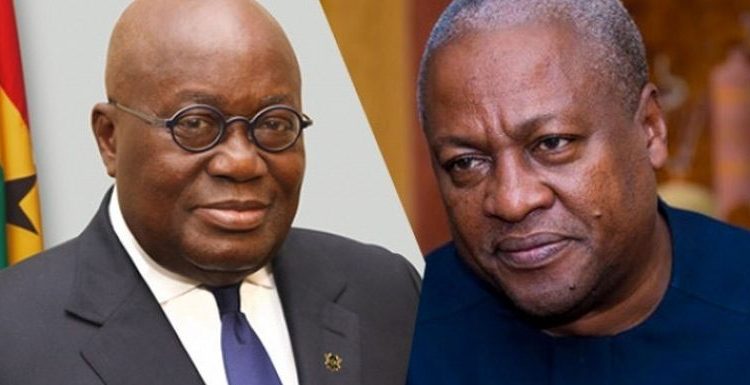President Akufo-Addo and John Mahama
President Nana Addo Dankwa Akufo-Addo has beaten former President John Dramani Mahama on the recent corruption rating posted by the world-acclaimed Transparency International with regard to its afrobarometer report on corruption for the years 2015 and 2019.
The drop in the incidence of corruption at the Presidency from the figure of 47% in 2015 to 27% speaks volumes about which of the two leaders deserves plaudits since the New Patriotic Party (NPP) took over as the ruling party.
The highly esteemed and much awaited Transparency International’s 2019 Afrobarometer Report should constitute an unbiased response to the opposition National Democratic Congress’ (NDC) claim that former President Mahama has a better anti-corruption record.
Declining Corruption Rate
The most significant aspect of the survey report is the steady decline in the incidence of corruption in the country since the previous government was replaced by the current.
The report has it that whereas the overall bribery rate in 2015 stood at 36%, this figure dropped to 33% in 2019.
In public schools, the figure of 24% for incidence of bribery dropped to 15% this year. For public clinics and health centres, the 2015 figure of 17% dropped to 12% in 2019 and in IDs, the 2015 figure of 38% read 33% in 2019.
In the area of public utilities, the incidence of bribery of 35% in 2015 fell to 23% in 2019.
Bribery In Police
Of particular importance is the decline in the incidence of bribery in the police which figure of 58% in 2015 changed to 24% this year.
Corruption In Institutions
The corruption rate of 47% among MPs in 2015 dropped to 27% in 2019 under the present government and the figure of 53% for government officials dropping to 35% this year.
The figure of 43% for local government officials dropped to 27% and among judges and magistrates, the figure of 49% reduced to 38%.
Among religious leaders, the figure of 25% went down to 17% and among NGOs, the figure of 25% changed to 14% this year.
Among business executives, corruption figure of 44% fell to 22% and that of traditional leaders moved from 37% to 28%.
Has Corruption Dropped?
Seventy-six per cent (76%) of Ghanaians surveyed in 2015 felt corruption level had increased in the past 12 months but in 2019 only 23% thought so.
In 2015, 8% of Ghanaians thought corruption level decreased in the past 12 months but in 2019 the figure increased to 36%.
Is Government Doing Well?
In 2015, whereas 25% of Ghanaians thought government was doing well in the fight against corruption in 2019 the figure moved to 60%.
With the government in power (Mahama & NDC) in 2015 attracting 71% as doing badly in the fight against corruption, the President Akufo-Addo and his NPP had only 30% saying same.
Whereas 33% of Ghanaians think corruption increased in the previous 12 months, 30% hold the view that government is doing a bad job at tackling it.
Transparency International is a global movement which seeks to rid countries of corruption by periodically releasing such reports. It has more than 100 worldwide and an international secretariat in Berlin, Germany.
Corruption continues to bedevil most African countries constituting the source of their inability to provide social services to their peoples among other deficiencies.
President Akufo-Addo during his speech at the Ghana Bar Association conference in Takoradi flaunted his record so far in the fight against corruption.
He reiterated specifically that he did not come to public office to enrich himself, a statement the opposition NDC has found it difficult to counter.
Expectedly, the opposition NDC organized a press conference on Tuesday to challenge the President on his claims of fighting corruption but could not say the President is personally corrupt.
The afrobarometer corruption report presents to Ghanaians and others the true picture of who has done better and showed sincerity in the fight against corruption.
By A.R. Gomda


